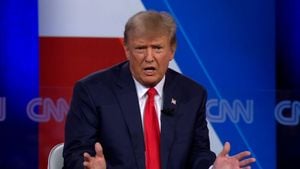The political atmosphere surrounding Donald Trump is as dynamic as ever, especially following his recent victory announcement. Just days after clinching the nomination for the 2024 presidential election, Trump made headlines with his ambitious agenda, particularly marking the start of his anticipated term with decisive and, for many, controversial proposals.
Trump has outlined plans for his first 100 days, which promise significant shifts from current policies. On day one, he aims to initiate the largest deportation program America has seen, rolling back many of the immigration policies put forth by the Biden administration. He plans to invoke the Alien Enemies Act of 1798, which would allow him to deport foreign nationals without the need for legal proceedings, creating what insiders describe as a “shock and awe” environment to deter undocumented immigrants.
Many are bracing for impacts on key issues like climate policy and healthcare. Trump has promised to dismantle Biden’s climate initiatives and ramp up domestic energy production. He’s signaling plans to revise the Affordable Care Act, as well as imposing new tariffs on American imports, potentially leading to increased costs for consumers.
Beyond these policy shifts, Trump also has his eyes on the cultural battlefield. He is determined to push legislation to ban transgender women from female sports competitions and to eliminate the teaching of Critical Race Theory (CRT) from public schools. These contentious topics have already ignited heated debates, showcasing the division among voters over such cultural issues.
With this ambitious agenda, Trump has also appointed his campaign manager, Susie Wiles, to serve as his chief of staff—a historic move as she becomes the first woman to hold the role. This undoubtedly speaks to Trump’s strategy of filling his administration with loyal allies, particularly those who align with his vision of governance, and he will have many positions to fill soon, potentially as many as 4,000 across various federal departments.
The transition process is already proving to be somewhat chaotic. Traditionally, presidential transitions begin well before Election Day, but Trump’s team reportedly lagged behind, creating challenges as they scramble to get organized. The delayed formal agreements with the General Services Administration outlining the transition procedures reflect the disorder. According to reports, intense competition for desirable appointments is shaping up, with loyalty to Trump being the most cited quality necessary to join his cabinet.
Trump's return has also raised questions about accountability. He has publicly stated his intent to grant pardons to individuals charged for their roles in the January 6 Capitol riot, referring to them as political hostages. With more than 1,000 people facing federal charges connected to the insurrection, this offer of clemency may draw mixed reactions. While some supporters view it as justified, others see it as placing the rule of law at risk.
This vow to pardon has intensified scrutiny of the legal repercussions faced by the rioters, some of whom have already been convicted of serious crimes, including assaults on law enforcement officials. The investigation initiated by federal authorities on January 6 remains one of the most substantial undertaken by the Justice Department, highlighting the gravity of the events of the day and the ensuing criminal actions.
Globally, Trump’s return to the political stage has elicited reactions from foreign leaders, many of whom are watching closely to see how his policies might shape international relations. Trump's presidency was marked by unpredictability, and with him back for another term, allies and adversaries alike are likely bracing for his trademark approach to foreign policy.
Despite the multifaceted challenges and controversies, Trump's supporters remain fervent. They often express their belief in his capability to rejuvenate the economy, bolster national security, and reestablish what they perceive as lost American values. Yet, the underlying tensions within the electorate over immigration, climate change, and cultural identity are palpable and sure to influence voter sentiment as the election approaches.
With the political stakes as high as they are, Trump's strategies for imminent governance may well shape the contours of both domestic and foreign policy for years to come. Until the inauguration, the country is bound to witness heightened debates, public discourse, and perhaps unforeseen developments as the political race continues to heat up.



